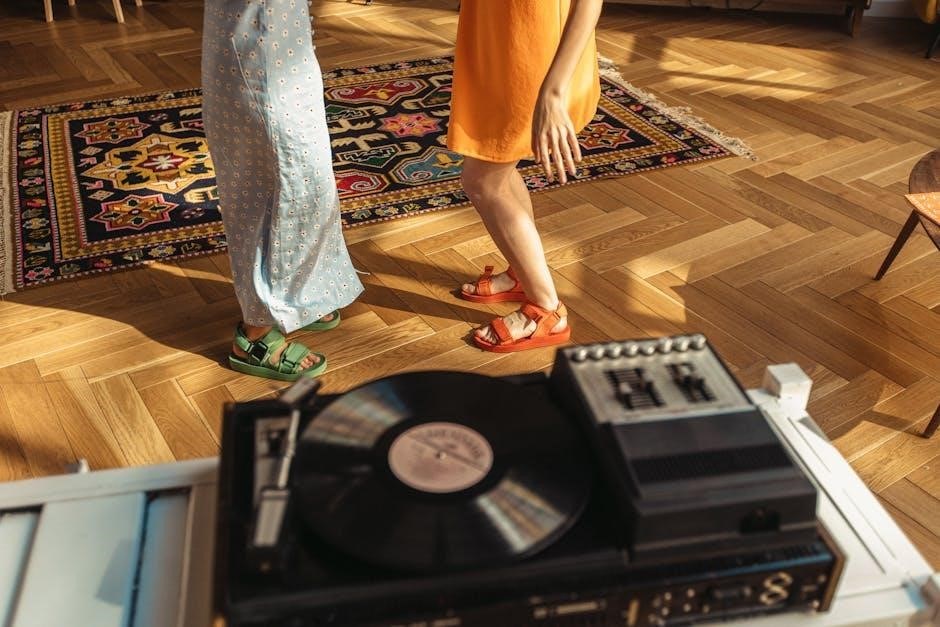Vinyl flooring thickness is a critical factor in determining durability and performance․ Typically ranging from 2mm to 8mm‚ it significantly impacts suitability for various residential and commercial spaces․
Overview of Vinyl Flooring and Its Importance
Vinyl flooring is a versatile and popular choice for homeowners and businesses due to its durability‚ affordability‚ and aesthetic appeal․ It offers a wide range of designs‚ mimicking natural materials like wood and stone‚ making it suitable for various decorative styles․ Vinyl flooring is known for its resistance to moisture‚ ease of maintenance‚ and ability to withstand heavy foot traffic‚ making it ideal for kitchens‚ bathrooms‚ and commercial spaces․ Its importance lies in its ability to provide a practical yet stylish solution for flooring needs‚ offering long-term performance and value․ Its adaptability and resilience ensure it remains a top choice for modern interiors․
Why Thickness Matters for Vinyl Flooring
The thickness of vinyl flooring plays a pivotal role in its performance and longevity․ Thicker flooring offers greater stability‚ reducing the “hollow-spot” effect and providing a more solid feel underfoot․ It also enhances durability‚ especially in high-traffic areas‚ by resisting wear and tear more effectively․ Additionally‚ thicker vinyl flooring often includes a more robust wear layer‚ which acts as a protective barrier against scratches and moisture․ This ensures the flooring retains its appearance and functionality over time․ Choosing the right thickness is essential to balance aesthetics‚ comfort‚ and practicality‚ making it a critical consideration for both residential and commercial applications․

This guide explores vinyl flooring thickness options‚ focusing on standard ranges (2-8mm)‚ factors affecting choice‚ and the role of the wear layer in durability․
Standard Thickness Ranges for Vinyl Flooring
Vinyl flooring thickness typically ranges from 2mm to 8mm‚ catering to various applications․ Thinner options (2-4mm) are ideal for low-traffic areas‚ offering a budget-friendly solution․ Medium thickness (4-6mm) is suitable for residential use‚ balancing durability and cost․ Thicker options (5-8mm) are recommended for high-traffic spaces or commercial settings‚ providing enhanced stability and longevity․ The wear layer thickness‚ measured in mils‚ also plays a crucial role‚ with thicker layers offering better protection against wear and tear․ Understanding these standard ranges helps homeowners and buyers select the most appropriate vinyl flooring for their specific needs and ensure optimal performance․
Understanding the Wear Layer and Its Significance
The wear layer is a protective coating on vinyl flooring‚ measured in mils (1/1000 of an inch)․ Its thickness significantly impacts durability and longevity․ A thicker wear layer‚ typically ranging from 6 to 40 mil‚ offers superior resistance to scratches‚ dents‚ and fading‚ making it ideal for high-traffic areas․ For low-traffic spaces‚ a thinner wear layer (around 6 mil) may suffice․ The wear layer is crucial as it shields the decorative design and core layers from damage․ Over time‚ a worn-out wear layer can lead to the need for premature replacement‚ emphasizing the importance of selecting an appropriate thickness based on usage․
How to Measure Vinyl Flooring Thickness
Measuring vinyl flooring thickness is straightforward and essential for ensuring suitability․ Use a digital caliper for precise measurements‚ focusing on the entire plank‚ including the core and wear layer․ For thicker options‚ a ruler or tape measure can also suffice․ Accurate measurement ensures the flooring meets durability and fit requirements for your space․ Always measure multiple points to confirm consistency‚ as variations may indicate manufacturing differences․ Proper measurement helps in selecting the right thickness for intended use‚ ensuring long-term performance and satisfaction․

Types of Vinyl Flooring and Their Thickness
Vinyl flooring comes in various types‚ including Luxury Vinyl Planks (LVP)‚ glue-down‚ and loose lay․ Each type offers different thickness options to suit specific needs and spaces․
Luxury Vinyl Planks (LVP) and Their Thickness Options
Luxury Vinyl Planks (LVP) are a popular choice for flooring due to their durability and realistic designs․ Thickness options typically range from 4mm to 8mm‚ with standard residential options between 6․5mm (1/4 inch) and 9․5mm (3/8 inch)․ Thicker LVP‚ such as 15mm (5/8 inch)‚ offers enhanced stability and sound reduction‚ making it ideal for high-traffic areas․ The wear layer‚ measured in mils‚ plays a crucial role in durability‚ with thicker layers (12 mil or more) recommended for busy spaces․ LVP’s versatility in thickness allows homeowners to choose the perfect balance of performance and aesthetics for their specific needs․
Glue-Down Vinyl Flooring: Thickness and Durability
Glue-down vinyl flooring is known for its durability and cost-effectiveness‚ typically featuring a thickness range of 2mm to 3mm․ This thinner profile makes it a budget-friendly option while still providing robust performance․ Installed using a strong adhesive‚ it adheres directly to the subfloor‚ ensuring stability and a long-lasting bond․ Despite its thinner construction‚ glue-down vinyl is highly durable‚ making it suitable for both residential and commercial spaces with high traffic․ Its compact design also allows for easier installation on uneven subfloors‚ offering a practical solution for various flooring needs without compromising on performance or aesthetic appeal․
Loose Lay and Peel-and-Stick Vinyl Flooring: Thickness Considerations
Loose lay and peel-and-stick vinyl flooring offer convenience and ease of installation‚ but their thickness plays a significant role in durability․ Loose lay flooring typically ranges from 2mm to 3mm in thickness‚ featuring a wear layer of up to 6 mil․ It is suitable for low-traffic areas due to its thinner profile and susceptibility to wear․ Peel-and-stick options are even thinner‚ measuring between 0․1mm and 0․2mm with a wear layer of no more than 3 mil․ These are ideal for budget-conscious projects or temporary solutions‚ as they are less durable and prone to quicker degradation․ Both options are best for DIY projects and light use․
Factors to Consider When Choosing Vinyl Flooring Thickness
When selecting vinyl flooring thickness‚ consider traffic levels‚ subfloor conditions‚ and intended use․ Thicker options offer durability for high-traffic areas‚ while thinner choices suit low-traffic spaces and budgets․
Traffic Levels and Their Impact on Flooring Choice
Traffic levels significantly influence the choice of vinyl flooring thickness․ High-traffic areas‚ such as kitchens and hallways‚ require thicker vinyl flooring (5-8mm) for increased durability and resistance to wear․ Medium traffic areas‚ like living rooms‚ can opt for 4-5mm thickness‚ offering a balance between durability and cost․ Low-traffic spaces‚ such as bedrooms‚ can use thinner options (2-4mm) for a budget-friendly solution․ The wear layer thickness is equally crucial‚ with high-traffic areas benefiting from thicker wear layers (12 mil or more) to extend the floor’s lifespan and reduce maintenance costs over time․
Subfloor Conditions and Vinyl Flooring Compatibility
Subfloor conditions play a crucial role in determining the compatibility and performance of vinyl flooring․ Concrete subfloors are stable and suitable for most vinyl thicknesses‚ while wooden subfloors may require thicker vinyl (4-6mm) for added stability․ Uneven subfloors can cause instability‚ regardless of thickness‚ emphasizing the need for proper preparation․ Loose lay and peel-and-stick options are more forgiving but still require a smooth‚ dry surface․ The subfloor’s material and condition directly impact the flooring’s longevity‚ making it essential to choose a thickness that complements the existing surface for optimal results and durability․

Installation and Maintenance Tips
Proper installation and maintenance are vital for extending the life of vinyl flooring․ Thicker options (5-8mm) are easier to install and maintain‚ reducing noise and wear over time․
How Thickness Affects Installation Complexity
Vinyl flooring thickness directly impacts installation complexity․ Thicker options (5-8mm) are more stable and easier to handle‚ reducing the risk of bending or curling during installation․ Thinner sheets (2-3mm) may require professional expertise to ensure a seamless fit‚ especially on uneven subfloors․ The wear layer thickness also plays a role‚ as thicker layers provide better durability but may complicate cutting and fitting․ Proper tools and techniques are essential for achieving a smooth finish‚ regardless of thickness․
Maintenance Recommendations Based on Thickness
Maintenance needs for vinyl flooring vary with thickness․ Thicker vinyl (5mm+) is more durable and requires less frequent deep cleaning‚ as it resists scratches and dents better․ Regular sweeping and mopping suffice‚ while heavy traffic areas may need occasional polishing․ Thinner options (2-4mm) demand more care to avoid damage‚ requiring gentle cleaning products and avoiding heavy furniture․ For all thicknesses‚ avoiding abrasive cleaners and using felt pads on furniture legs can extend longevity․ Proper maintenance ensures the flooring retains its appearance and performance‚ regardless of thickness․
Warranty and Longevity
Thickness directly impacts warranty and longevity․ Thicker vinyl (4-8mm) offers longer warranties (10-20+ years)‚ while thinner options (2-3mm) may have shorter coverage․ Wear layer thickness also affects durability․
Impact of Thickness on Vinyl Flooring Warranty
The thickness of vinyl flooring significantly influences its warranty coverage․ Thicker flooring‚ typically ranging from 4mm to 8mm‚ often comes with extended warranties‚ lasting up to 20 years or more․ This is because thicker materials are more durable and resistant to wear‚ reducing the likelihood of premature damage․ On the other hand‚ thinner vinyl flooring (2-3mm) may have shorter or even no warranty‚ as it is more prone to wear and tear․ The wear layer thickness also plays a crucial role‚ with thicker layers (20 mil and above) usually offering better protection and longer warranty periods․ Thus‚ choosing a thicker vinyl flooring ensures both longevity and peace of mind through robust warranty coverage․
Longevity of Vinyl Flooring: Thickness vs․ Wear Layer
The longevity of vinyl flooring is significantly influenced by both its overall thickness and the wear layer․ While a thicker flooring (4mm to 8mm) provides greater stability and durability‚ the wear layer plays a more critical role in determining resistance to scratches and abrasion․ A thicker wear layer (12 mil or more) offers superior protection‚ extending the flooring’s lifespan‚ especially in high-traffic areas․ However‚ even a thicker flooring with a thin wear layer may not last as long‚ as the protective barrier is compromised․ Balancing both factors ensures optimal performance and longevity‚ making the wear layer the ultimate determinant of long-term durability․

Final Guide to Choosing the Right Thickness
Choosing the right vinyl flooring thickness involves balancing traffic levels‚ subfloor conditions‚ and budget․ Opt for 4-6mm for residential use and 7-8mm for high-traffic or commercial spaces․
Step-by-Step Guide to Selecting Vinyl Flooring Thickness
To select the right vinyl flooring thickness:
Assess your space’s traffic level—high-traffic areas need thicker options (7-8mm)․
Consider the subfloor type; concrete may require less thickness than wood․
Evaluate the wear layer; thicker layers (20+ mil) offer better durability․
Determine your budget—thicker flooring is more durable but costlier․
Measure and inspect the subfloor for evenness to ensure proper installation․
Consider noise reduction needs; thicker planks minimize sound․
Review warranties; thicker flooring often comes with longer warranties․
Finally‚ choose a thickness that balances performance and aesthetics for your specific needs․
Key Takeaways for Homeowners and Buyers
Homeowners and buyers should prioritize vinyl flooring thickness based on traffic and durability needs․ Thicker options (5-8mm) are ideal for high-traffic areas‚ offering longevity and stability․ Always check the wear layer thickness‚ as it directly impacts the floor’s lifespan․ For budget-friendly solutions‚ 2-4mm thickness suffices for low-traffic spaces․ Ensure subfloor compatibility and consider noise reduction requirements․ Warranties often correlate with thickness‚ so thicker flooring typically offers longer protection․ Balancing aesthetic preferences with practical needs ensures a satisfying‚ long-lasting flooring choice․
